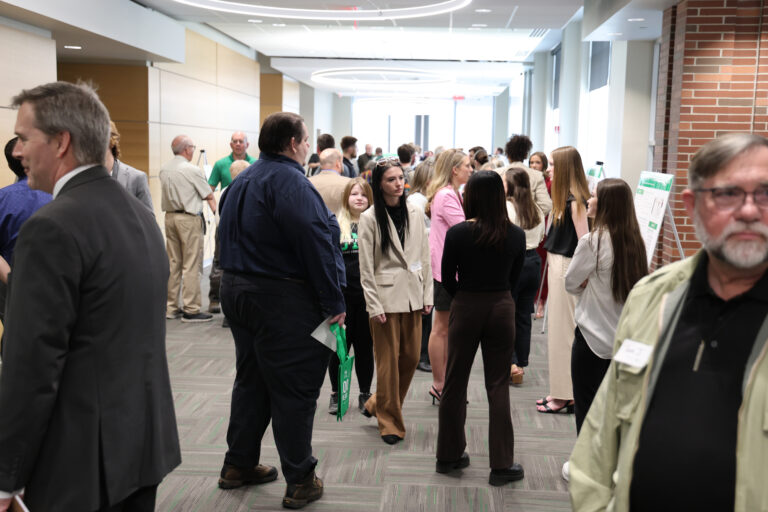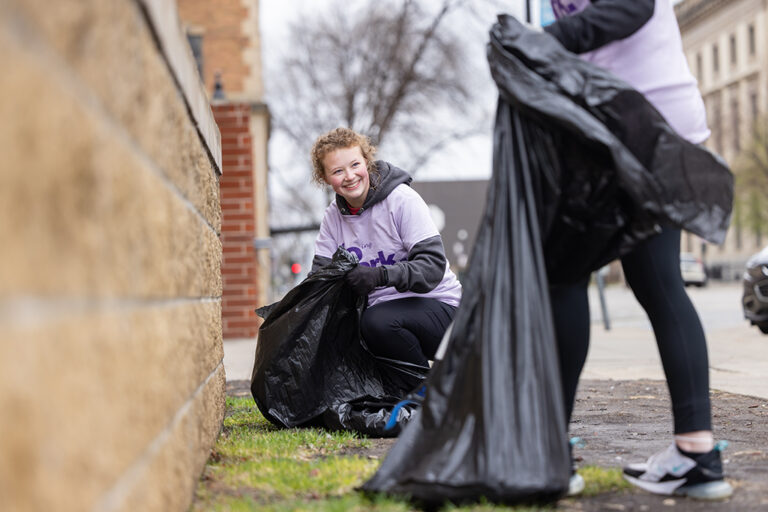How nursing research informs nursing practice
Research can improve patients’ outcomes as well as nurses’ professional lives, National Institute of Nursing Research director says at UND

On April 19, a high-profile member of the nursing profession visited the UND College of Nursing & Professional Disciplines. The visitor was Shannon Zenk, director of the National Institute of Nursing Research, a part of the National Institutes of Health that conducts research and establishes a scientific basis for evolving nursing practices.
During a 45-minute fireside chat with CNPD Dean Maridee Shogren, Zenk shared her insights with the nearly 250 students in attendance. She emphasized the importance of the symbiotic relationship between nursing practice and research.
“They need to be interconnected. One informs the other,” Zenk said. “What we see in our practice informs the types of research questions we ask, and it’s really important that we take the evidence generated from research and apply it to our practice. There’s a continuum, and nurses are involved in the whole process.”
Zenk developed an interest in research after transitioning from the more traditional surgical-medical setting to one focusing on homecare. As she visited patients in their homes and interacted more directly with communities, she began to recognize common problems faced by populations with higher rates of illness — and this led to a growing interest in research.
“I was really struck by the differences in the resources people have, the differences in the communities and the implications that those factors had for people’s health,” Zenk said.
Early on in their conversation, Shogren asked Zenk what she believes to be the most urgent struggles faced in healthcare. Zenk replied that research increasingly shows a need to address gaps in health outcomes based on socioeconomic and racial differences.
“These disparities are among the biggest challenges we face, and we cannot address those challenges unless we take a big-picture approach to understanding health detriments and solutions,” Zenk said. “That means we’re looking upstream at the most fundamental drivers of what shapes our health: poverty, race, housing and food access and affordability.”
An increased focus on research regarding “upstream” contributors to overall health will equip healthcare professionals with the tools to address the root causes of illness before they manifest, Zenk said. And nurses, she said are uniquely positioned to help identify and solve these problems.
“The scope of our practice, the depth of our knowledge — from biological to societal — and our focus on individual patients, families and the community makes nursing research distinct,” she said. “Nurses have always had a really holistic perspective on health, and I think social determinants are a part of that.”

This broader approach to looking at community health outcomes has sparked an increased interest in healthcare equity, which Shogren says she’s seen flourishing in UND’s programs.
“We’ve seen a growing number of our students being especially interested in Indigenous health,” Shogren said, referencing the Recruitment & Retention of American Indians into Nursing or RAIN program. “We know that 79 percent of our nursing graduates from that program have gone on to be employees in Indigenous health centers in their home communities.”
In reply, Zenk said that that supporting a more diverse workforce is the next step toward creating a more equitable healthcare system.
“Both practice and research settings require people with diverse perspectives and diverse experiences to come together to really understand what is needed to improve people’s health,” she said. “We want to bring in people who haven’t had as much chance to have a seat at the table and give them opportunities to engage in research.”
Accordingly, Zenk hopes that as the table expands, nurses and nurse researchers will have more opportunities to improve the health of their communities.
“I’m always looking for opportunities to bring the nursing perspective — our voice, our viewpoint — to the table,” she said. “I hope that, as we move forward, we’ll apply our expertise and our experience to make a difference in reducing and eliminating health disparities.”

Following Shogren and Zenk’s discussion, the leaders opened the floor to questions from students and faculty, including questions about how students can get involved with research as undergraduates and how to find internships in the state.
A student looking ahead to graduation in May asked how she could integrate nursing research into her career when she is a practicing nurse.
“Don’t let go of those skills and the motivation you’re acquiring in class to look at and understand the research and literature,” Zenk replied. “I think it’s critically important to stay on top of the evidence and best practices to inform what you’re doing.”
Another student, interested in a research career, asked what being a nurse researcher is like. Zenk replied that while research roles and career paths are varied, the most fulfilling part of her work is the ability to connect with patients and the community.
“The most enjoyable part in my role is getting to talk with people and engage with communities to learn what’s important to them and what they think will work to improve their health,” she said. “Just like in practice, you’re getting to spend time with patients, families and communities. In research, that just looks a little different.”




